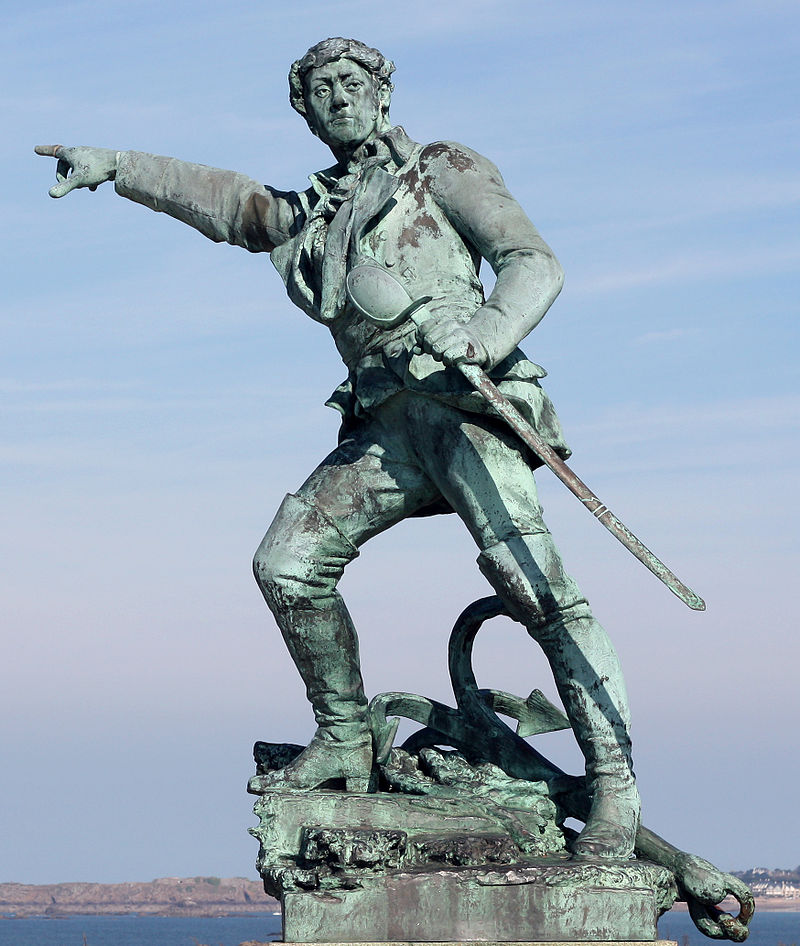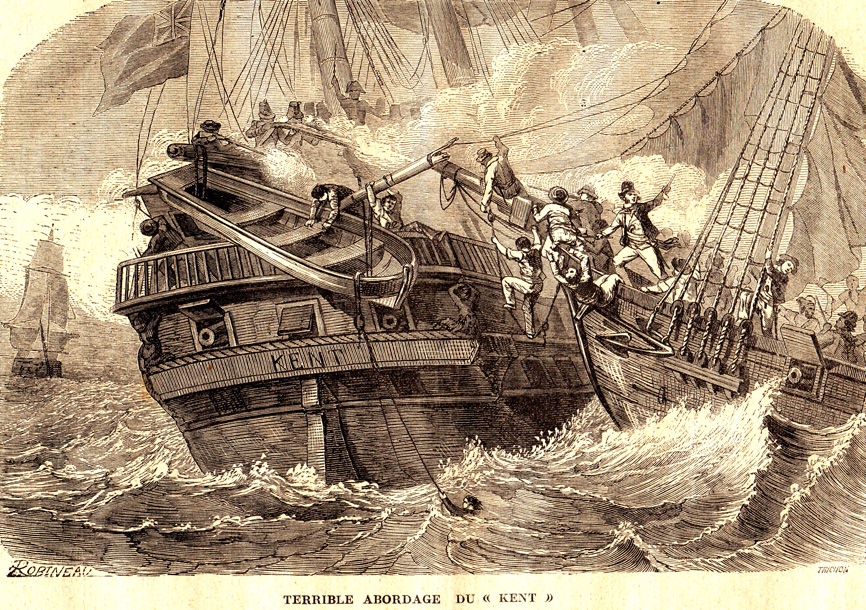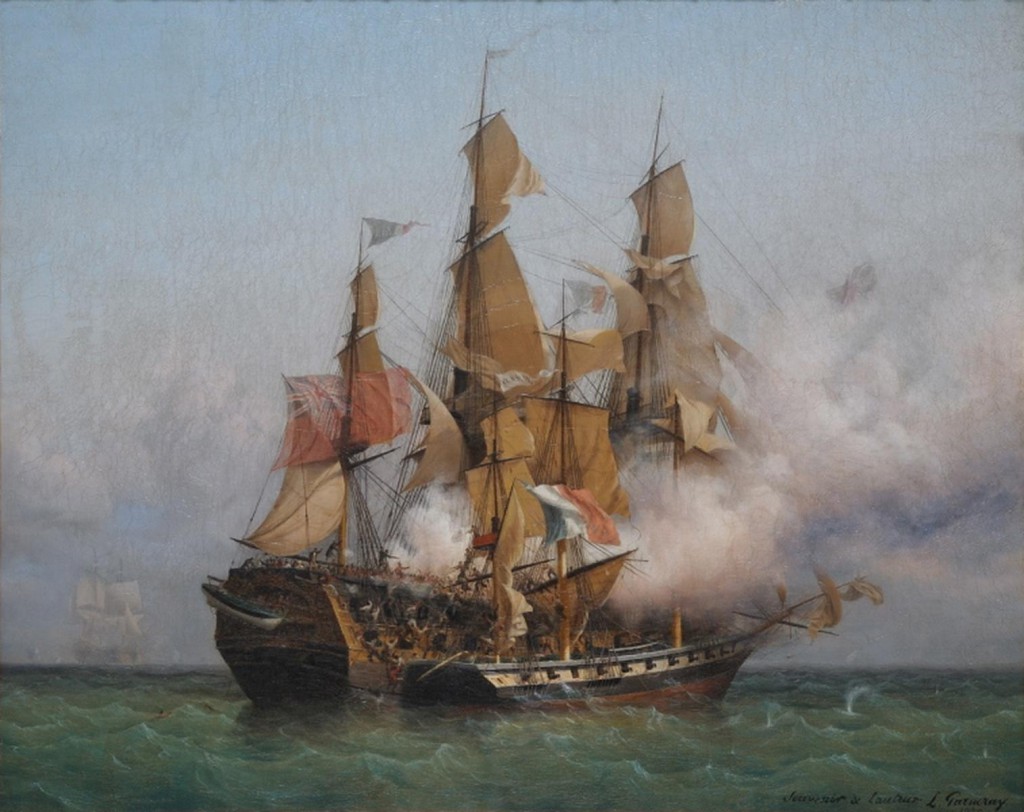The saturday night we returned from the battlefield of Waterloo, exhausted but proud and the boys of the 58th began to sing a song. I had heard already the refrain, to James and Diego, but this time they sang whole song. Later speaking with them, they commented to me that was called “Au 31 of mois d’aout” and that was a song of the French navy.

I passed all de return trip, whistling the song, so when arrives at homo I look for the letter of the song, with the intention to learn it, for and be able to sing it the next time with the comrades of the 58th.
This traditional song of the navy, narrates the history of a small French ship that captured a English ship much more great that he. Several versions exist, with small variations, but basically with the same argument.
It commemorates the combat of the 31 of August of 1800 (although some sources they make reference to the 7 of October) between the French Corsair “Confiance” and English frigate “Kent”. The Captian Robert Surcouf, has the commandl of the “Confiance”, a sloop (ship of 6º class) of 400 tons, with 150 crew and 18 guns. The English frigate “Kent” (ship of 4º class), of 1200 tn, a crew of 400 men and with 38 guns, that belonged to the Company of the Eastern Indians.

Captain Surcouf, sight the English ship, and put prow to the enemy. The “Kent” trusting its superiority, realised a warning shot, Surcouf raised the flag and the crew prepared herself for the combat. Both ships turned at the same time, and the “Kent” send a broadside, who do not accuse damages in the “Confiance”. Both captains looked for advantage on their opponent, the “Kent” look for a good firing position for their superior artillery, the “Confiance” to approach by the stern of the “Kent” to approach it and to thus avoid their guns. A broadside by port of the “Kent” damage the pawl of the “Confiance”, the “Kent” turned to try to shoot the starboard guns, this maneuver was useful by the “Confiance” to approach to the “Kent” by port with the unloaded guns. A shrapnel discharge district the cover of the “Kent”, killing to the captain and creating great confusion, which was taken advantage of by the French to approach the “Kent”. After a hard fight the “Kent” surrendered. The “Kent” underwent 11 dead and 36 injured, the “Confiance” 16 injured, of who 3 would die of their wounds.

During the refrain, it is mentioned the king of France, could have to the adaptation of a older song or to an adjustment subsequent to the end of the First Empire. This song is one of most popular of the navy. In that is praised the bravery of the French sailors in its fight against the secular enemy, England. Its refrain, in which it cheers up to offer and drinking, did it very popular in the taverns of the ports.

A small anecdote (little trustworthy), says that after the capture of the “Kent”, an official of the “Kent” recriminated to the Capitain of the “Confiance”:
“We, the English, fought for the honor, and you French them, fight for the money”
To which Captain Robert Surcouf, responded:
“It is always fought, for that one of it is not had.”
Le trente et un du mois d’août, (bis) Thirty the one of the month of August, (Bis)
Nous vîm’ venir sous l’vent à nous (bis) We saw come under the wind towards us (Bis)
Une frégate d’Angleterre A frigate from England
Qui fendait la mer et les flots, That it furrowed to the sea and the oceans,
C’était pour aller a Bordeaux. That it went towards Bordeaux.
Refrain Refrain
Buvons un coup, buvons en deux, We drink a drink, we drink two,
A la santé des amoureux To the health of the enamored ones
A la santé du Roi de France, To the health of the King of France,
Et merd’ pour le Roi d’Angleterre And shit for the King of England
Qui nous a déclaré la guerre! That it declared the war to us!
Le capitaine au même instant (bis) The captain at that same moment (Bis)
Fit appeler son lieutenant (bis) Made call to its lieutenant (Bis)
“Lieutenant, te sens-tu capable, “Lieutenant, you feel able,
Dis-moi, te sens-tu assez fort Tell me, you feel rather strong
Pour aller accoster à son bord ? In order to go to berth to its flank”
Refrain Refrain
Le lieutenant fier et hardi (bis) The lieutenant proud and intrepid (Bis)
Lui répondit : “Capitaine, oui ! (bis) Responded to Him: “Captain, yes! (Bis)
Faites monter votre équipage, Beam to raise your crew,
Braves soldats y matelots, Brave soldiers and sailors
Faites-les tous monter en haut!” Do to raise to them all above.”
Refrain Refrain
Le maître donn’ un coup d’sifflet : (bis) The foreman gave a whistle: (Bis)
En haut larguez les perroquet, (bis) In the top you release the sails, (Bis)
Larguez les ais et vent arrière, You release and tailwind,
Laisse porter jusqu’à son bord Let to us arrive until its flank
On verra bien qui s’ra le plus fort.” We will see who will be strongest.”
Refrain Refrain
Vir’ lof pour lof en arrivant (bis) It turns to windward when arriving (Bis)
Nous l’avons pris par son avant; (bis) We approached to him by its prow; (Bis)
A coups de hache d’abordage, To blows of boarding axe,
De sabres, piques et mousquetons of sabers, goads and muskets,
Nous l’avons mis à la raison. We made them enter in reason.
Refrain Refrain
Que va-t-on dit’ de lui bientôt (bis) Immediately what they will say of him, (Bis)
En Angleterre et à Bordeaux (bis) In England and Bordeaux (Bis)
D’avoir laissé prendr’ sa frégate By to have let capture its frigate
Par un Corsair’ de quinze canons, By a Corsair of fifteen guns,
Lui qu’en avait trente et si bons? He, who had thirty and so good.
Best regards
